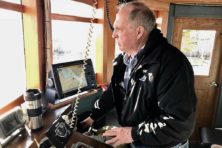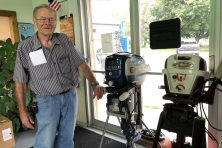Marine Business in the Blood
- Share
- Tweet
- Pin
- Share

Roen Salvage Co. President John Asher is in his 48th year with the company, and he is working on ways to preserve the legacy started by his grandfather, “Cap” John Roen. Photo by Katie Sikora.
On July 3, 1964, Roen Salvage Co. President John Asher received the child labor permit that allowed him to start working in the yards of the marine construction and dredging company started in 1949 by his parents, Charles and Hilda, and his grandfather, Captain John Roen, the man responsible for the raising of the freighter George M. Humphrey in 1944.
Now in his 48th year with the company – and his 40th in its offices – Asher is working on efforts to preserve Roen Salvage’s legacy, such as the “Shadows of our Maritime History” shadow-box exhibit which recently went on display at City Hall, and thinking about its future after his retirement.
With the past, present, and future of Roen Salvage in mind, Asher sat down to talk with writer Matt Ledger.
Note: The following conversation is edited for length.
Matt Ledger (ML): Did you a have a party to celebrate your 40th year in the offices? A big hoopla sort of thing?
John Asher (JA): No, in fact I had to remind my office that it had been 40 years. So this is what they gave me, this Roen Salvage Ruby Award (points to a framed certificate hanging on his wall). I guess a ruby is what you get when you’ve been married 40 years or something. They had to explain that to me.
ML: Were you always going into the family business?
JA: Yes. I loved being around equipment, machinery, tugboats, everything, since I was very young.
Of course, my grandfather had been in this business since he built his first little steamer in his backyard in 1919. In 1921, they launched it. That was in Charlevoix, Michigan. He moved over here in 1932 with his few pieces of equipment and set up residence in Sturgeon Bay.
Then in 1949, my mother and father started Roen Salvage Co. with the aid of my grandfather.
ML: Did they get along, your father and your grandfather?
JA: Oh yes, very much so. Both my mother and father graduated from Michigan State. My dad played football there. He was a fullback and a linebacker. He played in the first Orange Bowl.
My mother was from Charlevoix; he was from the Detroit area. She was in his chemistry class. She had a car, and he didn’t. So she gave him a ride after chemistry class over to the football field, and that’s how the story goes that they met each other and got married in August of 1940.
So anyway, “Cap” Roen, my grandfather, helped them start the business, and my father passed away in 1993. My mother died in 2001, so she stayed on as Chairman of the Board. She was involved all her life in the marine business. It’s like it’s in our blood.

John Asher points to his work permit issued on July 3, 1964 that allowed him to begin working in his family’s business, Roen Salvage Co. Photo by Katie Sikora.
ML: Is there pressure to measure up to your grandfather, who you’ve said is a legend of the Great Lakes?
JA: No, not really. It’s so different today from the ‘40s. We’re a long ways from there. But I believe we’ve done that.
In 1997-98, we did a job for the U.S. Army Corps of Engineers in White Lake, Michigan. As a result of the work we did, there was this $7.5 million breakwater job; we were awarded Public Works Contractor of the Year for the United States. Out of the $4 billion of work the Corps puts out each year, they picked our company and our project and gave us this award.
So I feel in some ways, “Cap” raised his Humphrey and got international fame from the Corps of Engineer, but we did this breakwater job and got recognition from that. I think he would have been proud of us.
ML: You said that Roen is currently at capacity for the year because of some recent contracts that have come in. Are you thinking about growing the business at all?
JA: No, that’s something before I ever got into this business, my dad asked me when I was still in college: ‘What would your plans be for the business? Would you want to expand it? Would you want to grow?’
I didn’t really know what to say at that time. But he said, ‘Be careful what you do because you can make a good living with the amount of equipment and the people you have working for you.’
And then there’s the amount of work we’ve seen since the 1990s, when they had the first war in the Middle East, when the government stopped using their funds for the marinas, the harbors, the breakwaters, the dredging, and all of a sudden they started putting it into building bombs and bullets. It just really changed a lot.
ML: Is there any chance that your children are coming back to run the family business?
JA: Well, I’ve asked both my children, my daughter Mariah and my son David. I told Mariah, ‘You could come back and run it as a woman-owned business, and that opens up a lot more doors for you than there are for me.’
And also, I asked David the same thing. I said, ‘Come on back and you’re more than welcome to take the business over and send me a few bucks, so I can buy food to exist.’
But they’re both right now so engaged in what they went to school for and what they want to do. They’re thinking about it. I had a good discussion with my son about it. He certainly has the ability and the knowledge to come back and do that.
So I told him to let me know in a couple years. Because I’m 63, and I’ve got to start looking down the road here at what’s going to happen with the company.


